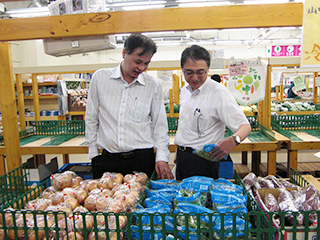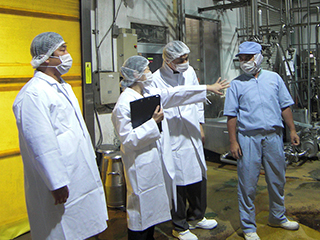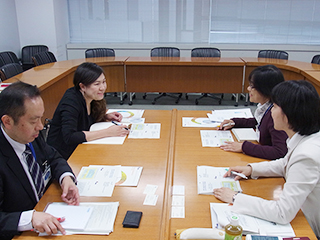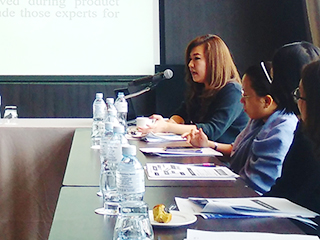1st Batch Fellows (FY2015-)
Here you can view reports on visits to Japan by the 1st batch fellows who started the SPRI program in 2015.
* The information about the fellows is correct as of the interview.

Dr. Piengpen Wongnapapan (Thailand)
Director, Science, Technology and Innovation Infrastructure Dept., National Science, Technology and Innovation Policy Office, Ministry of Science and Technology (From 2017: Deputy Executive Director, Insititute for Technology and Innovation Management, Mahidol University)
POLICY ISSUE: Innovation Strategy
Dr. Piengpen is the Director of the Science, Technology and Innovation Infrastructure Department within the National Science Technology and Innovation Policy Office at the Ministry of Science and Technology in Thailand. In cooperation with Japan’s Ministry of Economy, Trade and Industry (METI) and other government bodies, she is researching innovation promotion policy in Japan. The SPRI Program thus far has taken her to METI for discussions, as well as visits to car manufacturing plants, vehicle research centers, and many other locations.
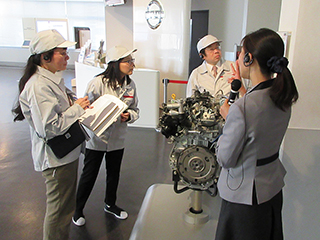
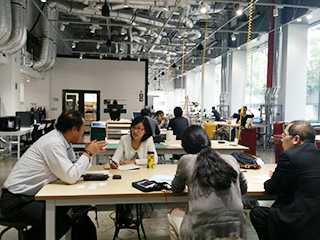
Left: Visiting the Nissan Engine Museum (on the 4th research visit to Japan), Right: Observing initiatives to create infrastructure for open innovation (on the 3rd research visit to Japan)
<Comments from Dr. Piengpen>
■After 2nd research visit to Japan (February 2016)
Creating a network for industrial innovation
Thailand is trying to promote research and development through foreign direct investment. In this SPRI Program, I have chosen two sectors to be my case studies – the automobile sector and the electronics sector. We’re trying to find out what the Thai Government can do to promote the R&D investment coming out of Japanese firms with bases in Thailand. I am working on the development of Thailand’s HR in the automobile sector and the electrics/electronics sector. There are so many technical skills as well as soft skills required to work for a Japanese company in Thailand. Japan has a unique work ethic and culture and there are language barriers. So HR development is a key thing. The other thing is to try and draft incentives – packages to promote R&D such as tax privileges and subsidies. So I’m here to find out the opportunities for Thailand.
I am trying to build the relationship between Japan and Thailand through the networks within my agency, (the National Science Technology Policy Office) and GRIPS. The SPRI Program provides you with everything – the connections, the interview subjects, private company connections –it is all arranged. I think it’s very important we conduct this type of groundwork investigation before we propose policy at the national level.

Dr. Nguyen Nhu Tiep (Viet Nam)
Director General, National Agro-forestry and Fisheries Quality Assurance Department (NAFIQAD), Ministry of Agriculture and Rural Development (MARD)
POLICY ISSUE: Food Value Chain
Director General Tiep is head of the National Agro-Forestry-Fisheries Quality Assurance Department of Viet Nam’s Ministry of Agriculture and Rural Development. Dr. Tiep is researching Japanese food value chain policy with the cooperation of GRIPS, Japan’s Ministry of Agriculture, Forestry and Fisheries (MAFF) and other government agencies. As part of this program, he receives lectures from GRIPS faculty members, leading researchers and specialists from MAFF, as well as makes field visits to agricultural producers, processed food manufacturers, wholesale markets, retailers, and agricultural cooperatives amongst other locations. The SPRI program is taking Dr. Tiep through all stages of the food value chain from production, processing and sales across a wide range of industries from horticulture, animal husbandry to diary.
Left: Visiting “michi-no-eki” roadside vegetable stores (on the 1st research visit to Japan), Right: Learning about the milk production process (on the 1st research visit to Japan)
<Comments from Dr. Tiep>
■After 2nd research visit to Japan (November 2015)
Resolving quality and productivity issues in agriculture
Viet Nam is a member of the TPP negotiations and we also have various FTAs with the EU, Korea, etc. That’s why we’d like to improve quality and competitiveness of our agri-products for better market access and strengthen agri-food value chain to in turn, improve the income for our farmers.
The SPRI Program allows me to find out the unique strengths of the Japanese policy and enforcement system for successful agricultural development and to propose better policy solutions for Viet Nam. In particular, we want to know how we can develop a higher quality and competitiveness in the agriculture sector – in particular how to strengthen the agriculture food value chain in Viet Nam – not only for domestic consumption but also to link our value chain to the global value chain. Our objectives are to expand domestic market sales and exports of agricultural products for the farmers of Viet Nam to essentially raise their incomes.
■After all research visits to Japan (June 2017)
Utilizing Japanese customs and experiences in Viet Nam
It was a great opportunity for me to learn from the outstanding Japanese researchers and experts, and to visit the related stakeholders of different successful food value chains in Japan. Through the research activities, I gained updated knowledge and understanding of the good practices and experiences of Japan in development and strengthening of food value chains.
The program outcomes will be utilized in preparation of policies and regulations, and the good practices and experiences of Japan will be shared with the related stakeholders in Viet Nam in order to develop and strengthen agricultural food value chains in my country.
 Dr. Nantana Kaisaeng (Thailand)
Dr. Nantana Kaisaeng (Thailand)
Pharmacist, Food and Drug Administration, Ministry of Public Health
POLICY ISSUE: Medical Product Regulatory Systems
Working within the Bureau of Drug Control for the Food and Drug Administration, Ministry of Public Health in Thailand, Dr. Kaisaeng is researching drug regulatory affairs with the cooperation of Japan’s Ministry of Health, Labor and Welfare and other government bodies. As Asia continues to show remarkable economic growth, with it there is an expanding market for new medicines. In the case of Thailand, regulatory bodies are struggling to maintain effective regulatory powers. As part of the SPRI Program, Dr. Kaisaeng is visiting Japan’s Pharmaceuticals and Medical Devices Agency (PMDA) as well as a variety of pharmaceutical manufacturers.
Left: Learning about production management and quality control in PMDA (on the 2nd research visit to Japan), Right: Sharing research results with relevant people in Thailand at a progress report meeting (May 2017, in Bangkok)
<Comments from Dr. Kaisaeng>
■After 2nd research visit to Japan (November 2015)
Towards resolution of issues concerning regulation of medical products in Thailand
Since being transferred to the Bureau of Drug Control in May 2015, I have been a regulatory reviewer to review drug applications. When pharmaceutical companies want to market their products, they must submit drug applications and need approval before they can sell them. By doing the SPRI program, the whole regulatory system of Food and Drug Administration will benefit, particularly in cutting down delays of drug applications in my country. Right now we are facing problems in delays of drug applications. We would like to improve the time from application to approval and learn from the Japanese regulatory system which has much shorter approval times.
From my last visit, I learnt that Japan 20 years ago faced the same situation as Thailand is now before the PMDA was established. So through the SPRI Program I have been conducting a benchmarking study, essentially a comparative study between the regulatory system in Japan and in Thailand and try to find the best practices and the best model for Thailand.
■After all research visits to Japan (June 2017)
Useful information for introducing a regulatory system for medicine into Thailand
Through the SPRI Program, I have learnt a lot about Japanese regulatory systems. The program has brought the new system for utilizing into practice. However, there are several factors involved that affect the introduction of Japanese regulatory systems into Thai systems, including existing laws and regulations, culture, and consumer behavior.
I feel extremely fortunate to be part of this SPRI program. Not only have I gained knowledge of the Japanese system, but also experience of learning Japanese culture and visiting this beautiful country. I appreciate being given this opportunity to participate in the SPRI program! Thank you.





